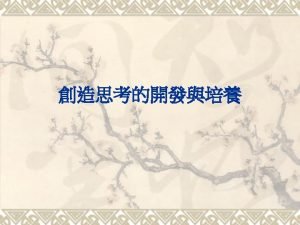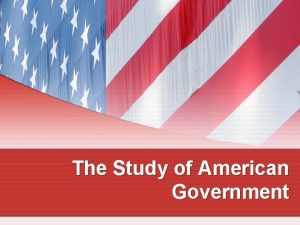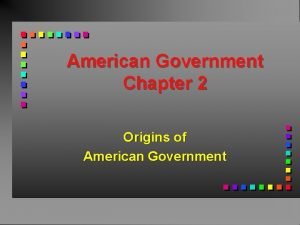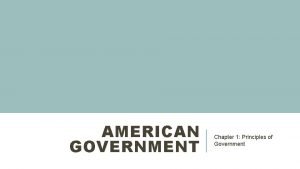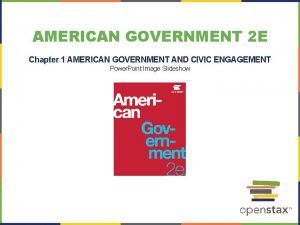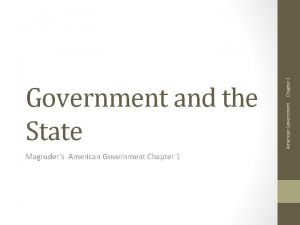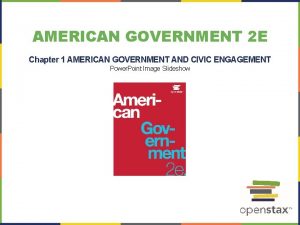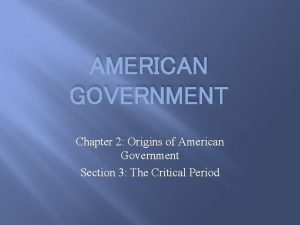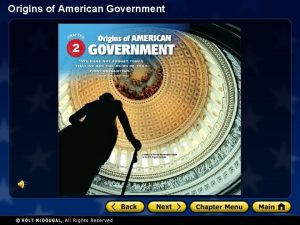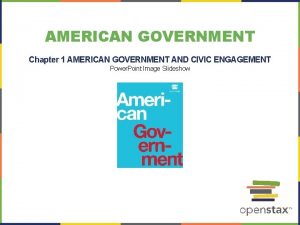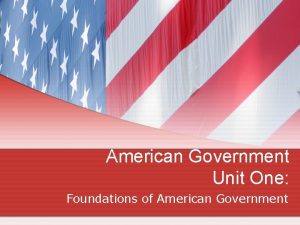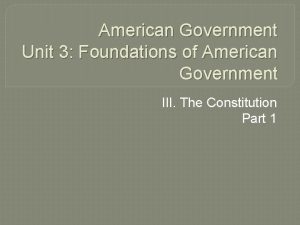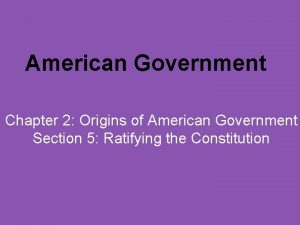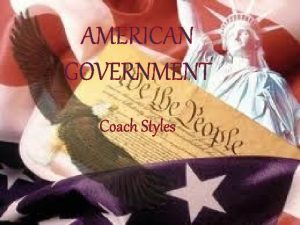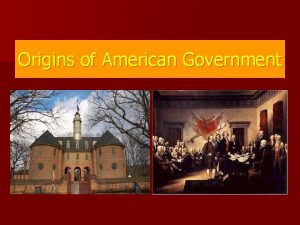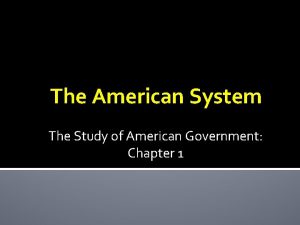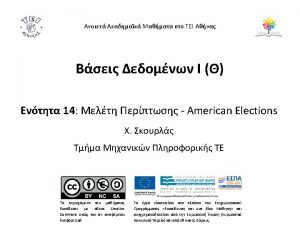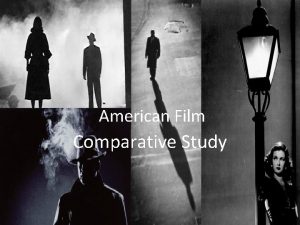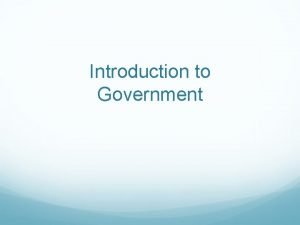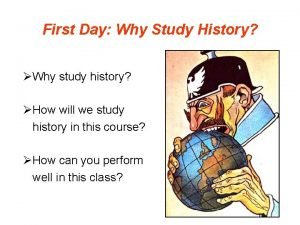The Study of American Government Why Is Government































- Slides: 31

The Study of American Government

Why Is Government Necessary? • Order • Liberty • Authority and Legitimacy 2 Copyright © 2011 Cengage Learning

Forms of Government • • Totalitarian Authoritarianism Aristocracy Democracy • Derived from the Greek words demos (“the people”) and kratos (“authority”) • Political authority comes from citizens 3 Copyright © 2011 Cengage Learning

Direct Democracy • Political decisions are made by the people directly, rather than by elected representatives • Attained most easily in small communities Voter registration in Chicago AP Photo/Nam Y. Huh 4 Copyright © 2011 Cengage Learning

Representative Democracy • Constitution established a representative democracy • Framers called this a Republic • Experimental • Power (votes) resides with citizens • Representatives make policy and law 5 Copyright © 2011 Cengage Learning

Direct Democracy Today • Initiative: voters can propose a law or a constitutional amendment • Referendum: referred by the legislature to the voters for approval/ disapproval • Recall: allows voters to dismiss an elected official from office before term expires 6 Copyright © 2011 Cengage Learning

Is Direct Democracy Dangerous? • Founders believed in government based on the consent of the people, but were highly distrustful of anything that might look like “mob rule. ” • Feared tyranny of majority over rights of the minority. • Believed “masses” were too uneducated to make informed decisions. • Devised institutions to filter the popular will through elected elites. 7 Copyright © 2011 Cengage Learning

A Democratic Republic Democratic republic and representative democracy really mean the same thing —government based on elected representatives— except for the historical quirk that a republic cannot have a vestigial king. National Portrait Gallery 8 Copyright © 2011 Cengage Learning

A Democratic Republic (cont. ) • Principles of Democratic Government • Universal suffrage • Majority rule • Constitutional Democracy • Limited government • Usually includes constitutional checks • Multiple points of access to power 9 Copyright © 2011 Cengage Learning

What Kind of Democracy Do We Have? • Majoritarianism • Government ought to do what majority of people desire • Elite theory • Society is ruled by small group who wish to further their own self-interests • Pluralism • Views politics as a conflict among interest groups, with decision-making characterized by bargaining and compromise 10 Copyright © 2011 Cengage Learning

Fundamental Values • Political Socialization • Liberty versus Order • Equality versus Liberty • Economic Equality • Property Rights • Capitalism 11 Copyright © 2011 Cengage Learning

Tensions Over Big Government • How much power should the American government have and what role should it play in the lives of citizens? • • • Gulf oil spill and cleanup Mining safety regulations Recalls (auto, food, pharmaceutical) Taxes National security policies 12 Copyright © 2011 Cengage Learning

Ideologies: Liberalism versus Conservatism • Conservatives • Favor limited government involvement in economy • Often favor government involvement in social issues to preserve traditional values • Liberals • Favor government regulation of economy to benefit society • On social issues, prefer limited government role 13 Copyright © 2011 Cengage Learning

A Four-Cornered Ideological Grid In this grid, the colored squares represent four different political ideologies. • The vertical choices range from cultural order to cultural liberty. • The horizontal choices range from economic equality to economic liberty. 14 Copyright © 2011 Cengage Learning

Ideologies: The Traditional Political Spectrum • Socialism: strong support for economic and social equality • Libertarianism: skepticism toward government 15 Copyright © 2011 Cengage Learning

Classical Liberalism • Liberal once meant limited government and no religion in politics. • Liberal evolved into its modern American meaning along with the political evolution of the Democratic Party, once the party of limited government, but now the party of (relative) economic equality. 16 Copyright © 2011 Cengage Learning

The Traditional Political Spectrum 17 Copyright © 2011 Cengage Learning

Other Ideologies • Communism: a revolutionary variant of socialism • Government control of all enterprises • Partisan dictatorship • No free markets • Fascism: often totalitarian • Absolute ruler • Rejection of individualism 18 Copyright © 2011 Cengage Learning

Ideologies in the Islamic World • While communism and fascism are the historical ideologies that totalitarianism was coined to describe, our current international concern is with the radical and fundamentalist interpretation of Islam known as Islamism. • Islamism rejects Western democratic values • Desires worldwide Islamic political order 19 Copyright © 2011 Cengage Learning

A Demographic Profile of America “Here is not merely a nation but a teeming Nation of nations” Walt Whitman 20 Copyright © 2011 Cengage Learning

Obama Election Night Click the icon to open the movie Video Supplied by Motion Gallery A news story showing brief clips of Obama speaking in Chicago’s Grant Park after his election win was confirmed. Air Date: 11/5/2008 21 Copyright © 2011 Cengage Learning

Video Questions 1. Was Obama’s election a direct result of the changing demographic breakdown in the U. S. ? 2. After this election, did ethnic background become more or less important for future candidates? 3. Where does Obama fall on the ideological grid? Has this changed since his election? 22 Copyright © 2011 Cengage Learning

Religious Diversity • Although a large majority (83%) of Americans still identify as Christians, Americans now claim affiliation with 1600 different religious affiliations and denominations. • About 16% are not religiously affiliated. 23 Copyright © 2011 Cengage Learning

The Changing Face of America • Aging • Population Growth • Ethnic Change • Changes in Hispanic community • Women • In the workforce • In Congress and state government 24 Copyright © 2011 Cengage Learning

Illegal Immigrants SOURCE: Washington Post, National Weekly Edition, May 29–June 4, 2006, 8. 25 Copyright © 2011 Cengage Learning

The U. S. Population © The New Yorker Collection 1992. J. B. Handelsman from cartoonbank. com. All rights reserved. Click here to go to the U. S. POPClock Projection 26 Copyright © 2011 Cengage Learning

The Aging of America *Data for 2025 and 2050 are projections. Source: U. S. Bureau of the Census. 27 Copyright © 2011 Cengage Learning

Changing U. S. Population 28 Copyright © 2011 Cengage Learning

Questions for Critical Thinking 1. Do you think a direct democracy is a rational option for governing in the United States? 2. Describe the forms of direct democracy that exist. Discuss the pros and cons of these mechanisms. 29 Copyright © 2011 Cengage Learning

Questions for Critical Thinking 3. Do some Americans equate security and order with protection against fellow citizens who are racially, culturally, or economically different? 4. Is protection against discrimination an important issue today? Which groups in American society most need protection? 30 Copyright © 2011 Cengage Learning

Web Links • U. S. Census Bureau • U. S. Citizenship and Immigration Services 31 Copyright © 2011 Cengage Learning
 Hey bye bye
Hey bye bye American government unit 1 study guide
American government unit 1 study guide Don't ask why why why
Don't ask why why why Hát kết hợp bộ gõ cơ thể
Hát kết hợp bộ gõ cơ thể Ng-html
Ng-html Bổ thể
Bổ thể Tỉ lệ cơ thể trẻ em
Tỉ lệ cơ thể trẻ em Gấu đi như thế nào
Gấu đi như thế nào Chụp tư thế worms-breton
Chụp tư thế worms-breton Hát lên người ơi alleluia
Hát lên người ơi alleluia Các môn thể thao bắt đầu bằng tiếng chạy
Các môn thể thao bắt đầu bằng tiếng chạy Thế nào là hệ số cao nhất
Thế nào là hệ số cao nhất Các châu lục và đại dương trên thế giới
Các châu lục và đại dương trên thế giới Công của trọng lực
Công của trọng lực Trời xanh đây là của chúng ta thể thơ
Trời xanh đây là của chúng ta thể thơ Mật thư anh em như thể tay chân
Mật thư anh em như thể tay chân Phép trừ bù
Phép trừ bù độ dài liên kết
độ dài liên kết Các châu lục và đại dương trên thế giới
Các châu lục và đại dương trên thế giới Thể thơ truyền thống
Thể thơ truyền thống Quá trình desamine hóa có thể tạo ra
Quá trình desamine hóa có thể tạo ra Một số thể thơ truyền thống
Một số thể thơ truyền thống Cái miệng nó xinh thế
Cái miệng nó xinh thế Vẽ hình chiếu vuông góc của vật thể sau
Vẽ hình chiếu vuông góc của vật thể sau Biện pháp chống mỏi cơ
Biện pháp chống mỏi cơ đặc điểm cơ thể của người tối cổ
đặc điểm cơ thể của người tối cổ V. c c
V. c c Vẽ hình chiếu đứng bằng cạnh của vật thể
Vẽ hình chiếu đứng bằng cạnh của vật thể Tia chieu sa te
Tia chieu sa te Thẻ vin
Thẻ vin đại từ thay thế
đại từ thay thế điện thế nghỉ
điện thế nghỉ


